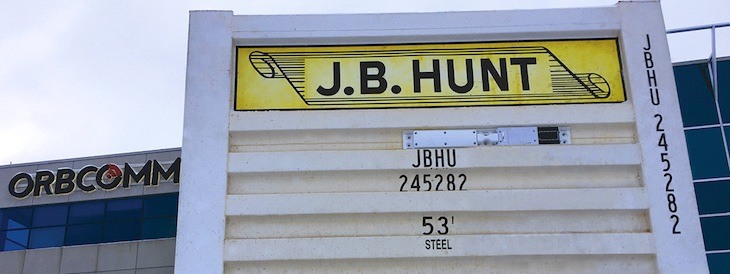J.B. Hunt’s 1Q earnings likely hurt by harsh winter, poor rail service, pay hikes
by April 10, 2018 5:03 pm 816 views

Lowell-based carrier J.B. Hunt Transport Services should see earnings rise in the first quarter of 2018 as a result of increased freight demand, but the rise is expected to be offset by bad weather, poor rail service and driver wage hikes.
In a first-quarter earnings preview, transportation analysts Brad Delco and Justin Long, along with associates Scott Schoenhaus and Brian Colley, all of Little Rock-based Stephens Inc., maintained a buy rating for J.B. Hunt shares but reduced the 12-month target for the stock by $7 to $133. Shares of J.B. Hunt (NASDAQ: JBHT) closed Tuesday at $111.43, up $2.22. In the past 52 weeks, the stock has traded between $126.49 and $83.35.
On Monday (April 16), J.B. Hunt is expected to report earnings per share will rise 17.4% to $1.08 in the first quarter of 2018, from the same period in 2017, based on a consensus of 20 analysts. Revenue is expected to increase 15.9% to $1.89 billion.
The Stephens analysts’ revision to J.B. Hunt’s shares came after Deutsche Bank changed its rating from to “buy” from “neutral” and set a 12-month target price of $141 on the stock as the bank expects freight demand will remain strong.
If J.B. Hunt were to beat the earnings estimates of Delco and Long, it would likely be the result of improved margins from its intermodal segment, according to the analysts. If the company were to report earnings of less than what they projected, this would likely be caused by reduced margins in the carrier’s Dedicated Contracts Services segment.
“Importantly, we believe (J.B. Hunt) is in the early rounds of bids, and think investors should focus more on rate progress than (first-quarter 2018) results,” according to Delco and Long. “Longer-term, we believe (J.B. Hunt) is a core transport holding in a better competitive position vs. peers with its diverse service offerings.”
The carrier’s intermodal segment, which accounted for 65% of its operating income in 2017, is expected to report load growth of 6%, according to Delco and Long. The growth is in line with intermodal volumes on U.S. railroads. In the first quarter of 2018, intermodal volume on the railroads rose 5.5% to 3.496 million containers and trailers, from the same period in 2017, according to the Association of American Railroads.
Between January and February, inbound container volumes on the West Coast increased 15.2%, from the same period in 2017, and are expected to increase transcontinental volumes, but Delco and Long said they expect the East to be more of a challenge as rail service has declined in the quarter. Rail carrier Norfolk Southern Corp. reported train speeds had declined 15.9% and terminal dwell rose 19.6% in the quarter, from the same period in 2017.
“On the pricing side, we believe (J.B. Hunt) is benefiting from early bid renegotiations as customers look to find capacity in a very tight (truckload) environment,” according to Delco and Long. “We believe the challenges this quarter relate to turning containers at a fast pace in addition to higher third-party drayage costs.”
Within the carrier’s intermodal segment, operating ratio, or expenses as a percentage of revenue, look to have deteriorated by almost 30 basis points to 90.1%, from the same period in 2017.
In Dedicated Contract Services, Delco and Long expect revenue to rise 21.3% to $476.2 million. Operating ratio is expected to be 91.2% as a result of the harsh winter in the Northeast and driver recruitment challenges. Revenue is expected to continue to rise in the segment, and margins look to improve in the second half of 2018. The segment should have a strong 2018, but the strength was offset mostly because of the weather.
In Integrated Capacity Solutions, or its brokerage segment, revenue is projected to increase 30% to $272.2 million. With the tight truckload capacity in the fourth quarter of 2017 and in the first quarter of 2018, Delco and Long expect net revenue to be flat from the fourth quarter of 2017. Operating ratio is projected to have improved 130 basis points to 96.6% in the first quarter, from the same period in 2017.
In the trucking segment, fewer trucks were used in the first quarter and should impact the segment’s miles per truck per week. Revenue is expected to fall 4.5% and operating ratio is projected to improve 70 basis points to 94%, from the same period in 2017.
J.B. Hunt stock should improve as it reports earnings increases that are expected as intermodal contract pricing rises and intermodal volume increases in a tight truckload market, according to Delco and Long, adding that the carrier has a “strong return profile, under-leveraged balance sheet and ability to return value to shareholders with further share repurchases and dividends.”
